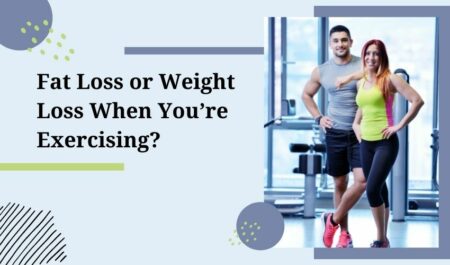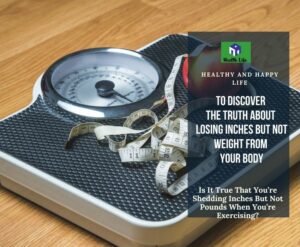You will most likely weigh yourself at some point along your diet and weight-loss journey. Your weight is more than just a number; it may have a huge impact on how you feel about yourself and your body image as well. If you go on the scale first thing in the morning and see a number that is lower than the previous day, you may feel better about your body image. If it’s higher than that, your day might not get off to a good start. In this article is going to discuss about losing inches but not weight from the body.
But what does your weight actually imply, and how useful is it in terms of measuring your weight reduction progress, exactly? Finding out the answers to those questions could provide you with a completely different perspective on your scale of measurement.
Discover the Truth About Your Weight
When you say you’re losing weight, you’re usually referring to the process of slimming down, not losing weight. Your hips, thighs, tummy, and arms may be among the places where you would like to lose weight. Weight loss is a peculiar phenomenon in that it does not necessarily translate into weight loss on the scale.

It is possible to lose weight without seeing a change in your body weight over time. This occurs when you lose body fat while also gaining muscle. This is an indicator that you are on the right route even if your weight remains the same while you lose inches in the process. Understanding the difference between losing weight and reducing body fat can have a big impact on how you view yourself and your ability to achieve success in your weight loss efforts.
A regular scale indicates your weight, but it does not reveal how much of it is made up of muscle, fat, water, bones, or organs, as it does with a body composition scale. Although a bodybuilder’s weight may be excessively high due to the accumulation of additional muscle, this does not necessarily mean that they are overweight or obese in any way. Identifying your body composition is critical if you want to see significant gains over time. Unfortunately, the standard scale does not provide this information to us.
Another factor contributing to the unreliability of scale weight is that it fluctuates continually. Throughout the day, your weight can fluctuate by up to 10 pounds depending on what and how much you eat and drink, how often you go to the bathroom, and whether or not you are retaining water.
Using the scale can be beneficial in a variety of circumstances. According to a study published in 2016, weighing oneself on a daily basis can help people sustain their weight loss. Because it is so simple to gain weight over time, a scale can be quite useful in keeping track of your weight.
Instead Of Focusing On Weight Loss, Try To Lose Fat Instead.
The scale, on the other hand, may not be the most useful instrument for people who are just starting out on a fat-loss program. If it isn’t helping you remain on track and reach your goals, it may be time to experiment with a different technique of measuring your progress.
It is significantly more important to concentrate on fat loss rather than on your weight than it is to concentrate on weight loss. When you lose body fat, you are permanently altering your physical appearance by altering your body composition to have less fat and more lean muscle mass. While losing weight, it is possible that you are losing water weight or even muscle tissue. It’s difficult to know whether the changes you’re seeing are real or if they’re simply the result of your daily routines, hormonal variations, and altering water levels.
Listed Below Are Some Examples Of How The Scale May Be Deceiving You.
It Is The Yardstick By Which Everything Is Judged.
In addition to muscles and fat, bones and organs as well as food and water all contribute to the overall weight displayed on the scale. As a result, the number on the scale may be deceiving in some instances.
It Is Unable To Accurately Depict The Changes That Are Taking Place In Your Physical Body.
Exercises that combine cardio and strength training may allow you to grow lean muscular tissue while simultaneously losing fat. The scale may not budge even though you are becoming leaner and smaller in this circumstance.

It Has Absolutely Nothing To Do With Your Physical Well-Being.
Inability to discriminate between fat and muscle is a problem with the scale. That means that a person can be underweight while still have dangerously high levels of body fat.
It Is Not Always A Motivator For Doing Good.
Imagine stepping on the scale and being unsatisfied with the results. What would you do then? You may begin to have doubts about what you’re doing and may even question why you’re doing it in the first instance. It is possible that concentrating solely on weight loss will conceal the positive effects you are experiencing, such as fat loss, improved endurance, and enhanced energy levels.
A New Approach To Determining Success
When you first start a weight-loss program, you may desire additional motivation and evidence that what you’re doing is helpful. This is normal. It’s possible that the scale will be unable to supply you with that information. It is important to use alternate tools to track your progress in order to stay motivated and comprehend that you are making progress, regardless of what the scale displays.
Keep in mind that your body loses weight as a result of your gender, age, genetics, and other uncontrolled factors, such as your diet and exercise regimen. If you’re not losing weight in your hips, it doesn’t always follow that you’re not losing weight elsewhere. It could come from a place that you don’t care about at all.
Consider Alternatives To Using A Scale To Track Your Progress In Addition To The Scale.
Make A Note Of How Your Outfit Fits On Your Person.
If they’re a little looser than usual, you’re on the right track. It’s advantageous to have one pair of jeans that is just a smidgeon too tight for comfort. Take the time to try them on once a month and make notes on how they fit. Clothes are not deceitful in any way.
Take Your Measures To Find Out If You’re Shedding Inches In Your Waistline.
It is possible that measuring your body at various points will assist you in determining whether or not you are losing fat. Knowing this may motivate you to continue your workouts and give your body time to acclimatize to the new demands of your routine.
To Assess Body Fat Percentage, Utilize A Scale That Measures Bioelectrical Impedance.
These scales are commonly available and come in a variety of price ranges; you might be able to find one at your local gym or fitness center. They’ll be able to tell you whether or not you’re losing fat and gaining muscle in a more precise manner.
Make Use Of A Calculator That Is Readily Available On The Internet.
However, if you repeat the test with the same calculator on a regular basis, you will be able to see whether or not your body fat % lowers.
Make A List Of Goals For Yourself.
Obsess over losing weight or losing fat is counterproductive; instead, concentrate on completing a specific amount of workouts each week or competing in a race. Test your endurance by seeing how many push-ups you can perform or how many days you can go without exercising. These are concrete, attainable objectives that provide you with a greater sense of immediate gratification than a number on the scale.
The Final Saying
If the scale is driving you mad, taking a vacation from weighing yourself may merely open your eyes to the possibility of other possibilities. Not only does your weight reflect your achievements, but so do your other physical characteristics. Consider taking the scale off the counter and seeing just how far you’ve come.
